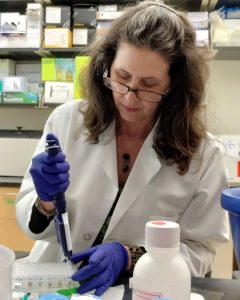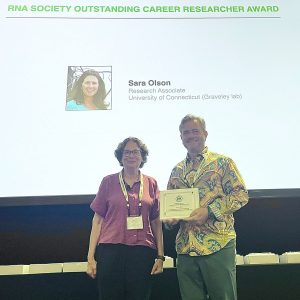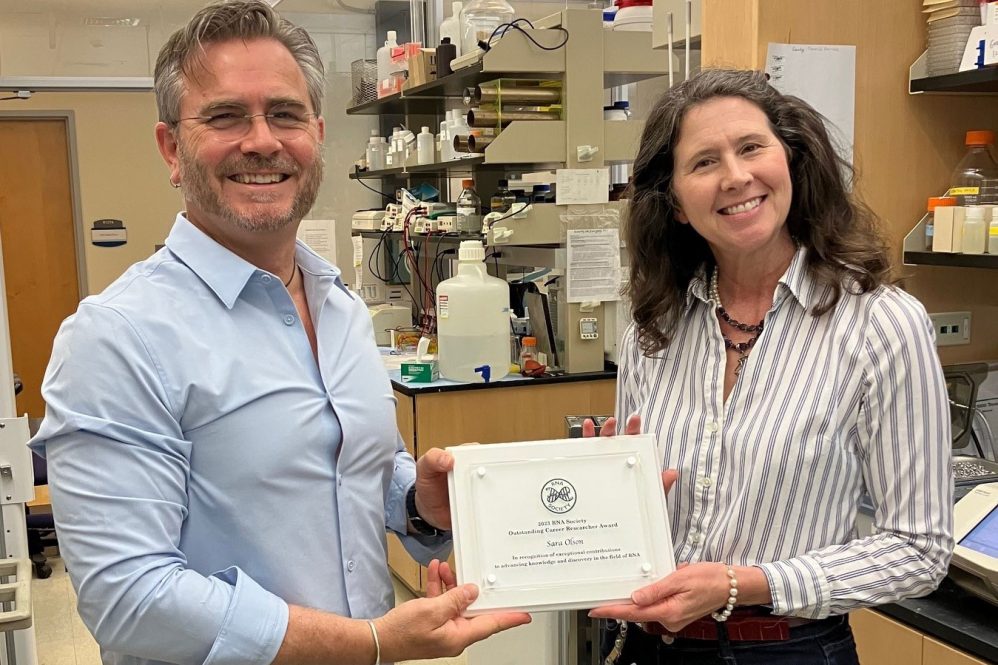Sara Olson is nearly 31 years into a research career that started at UConn Health in immunology, then shifted to genetics and genome sciences.
Working in the lab of Brenton Graveley, chair of genetics and genome sciences, for more than two decades now, molecular and cell biology has been her focus. And it’s that stretch of her career that’s earned her international recognition, in the form of the 2023 RNA Society Outstanding Career Researcher Award.

“I am humbled and honored,” Olson says. “It’s an important award recognizing great work and contributions over a long time to the study of RNA. My boss said, ‘Sara, why don’t you apply for this?’ I’ve been working with him for over 20 years, and we have a lot of papers published in well-respected journals.”
The RNA Society, a nonprofit international scientific society with more than 1,800 members, says its Outstanding Career Researcher Award recognizes exceptional contributions of career research scientists in advancing scientific discoveries in the field of ribonucleic acid, an important molecule in biological systems. Olson was honored for her “unparalleled” work in splicing and RNA binding proteins in fruit fly and human cells.
“We study proteins that bind to RNA, and we study something called RNA splicing,” Olson says. “The biological systems of using the RNA require a lot of proteins, and so we study these proteins. We can deplete the proteins in the cells and then ask what happens. That can tell us what the protein does.”
At the bench, it’s a combination of harvesting RNA from tissue culture cells grown in a Petri dish or from fruit flies grown in a vial, and sequencing the RNA purified from those cells.
Graveley says Olson has contributed to nearly 40 published papers, including 24 in his lab, eight of which were published in Cell or Nature, two of science’s most notable journals, and she was first co-author on several of those.

“Sara honestly has a stronger resume than most applicants for faculty positions,” Graveley says. “She is without a doubt the key member of my laboratory and has been for over two decades. Sara oversees my entire laboratory, managing all aspects of its operation, training new students, postdocs and research assistants.”
Olson studied molecular and cell biology as a UConn undergraduate, which included a six-month co-op working full-time at Pfizer. That positioned her for her first job out of college, in Leo LeFrancois’ immunology lab at UConn Health. Nine years later, Graveley arrived and started working in the Department of Genetics and Developmental Biology. That would become the Department of Genetics and Genome Sciences, which Graveley now chairs.
“I saw this as an opportunity to switch, to get back to more of the molecular and cell biology, which I really preferred over immunology,” Olson says. “So I felt like I was coming home.”
As the science advanced, so did the technology, and Olson found herself, to her surprise, gaining computer skills, including coding, in order to handle all the data RNA and DNA sequencing can generate.
“When talking about her with colleagues, I often refer to Sara as my ‘number 1’ (Star Trek Next Generation reference), and jokingly (kind of) say that we can communicate without speaking out loud,” Graveley says. “It is fair to say that my lab would not be the same without her.”



